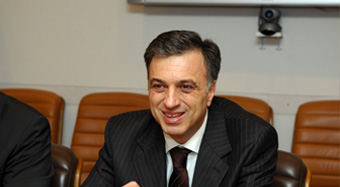
Filip Vujanovic
March 05, 2012
Born and raised in Belgrade, Vujanović graduated from the University of Belgrade's Law School. Between 1978 and 1981 he worked in one of the city's Municipal Courts, and later also as an assistant at the Belgrade District Court. In 1981, aged 27, he moved to Titograd. Following a short stint as secretary at Titograd's District Court, he worked as a lawyer until entering politics in March 1993.
Vujanović joined the Democratic Party of Socialists (DPS) in 1993 upon the invitation of Montenegrin federal President Momir Bulatović following the creation of the Federal Republic of Yugoslavia (comprising Montenegro and Serbia) in the wake of the break-up of the previous Yugoslavia.
He was Minister of Justice in Milo Đukanović's pro-Slobodan Milošević government (1993–1996), and then Interior Minister from 1996 to 1998 after Đukanović switched loyalty and turned against Milošević. During the 1997 DPSM leadership conflict, Vujanović initially declared neutrality. He eventually sided with Milo Đukanović after Đukanović won the presidential election. Đukanović then appointed Vujanović as the first Prime Minister of Montenegro; Vujanović served in that post from 5 February 1998 until 8 January 2003.
On 5 November 2002, he became speaker of the Montenegrin parliament, a position which, from 25 November 2002, made him Acting President of Montenegro due to the resignation of Đukanović from the presidency to prepare to switch office with Vujanović. Vujanović ran in the December 2002 presidential elections and won a landslide victory, receiving 86% of the vote, but the election was ruled invalid because turnout was less than 50%. The elections were held again in February 2003, with Vujanović winning 81% of the vote, but again turnout was below 50%. The elections were held for a third time on 11 May 2003, with the minimum turnout rule abolished, and Vujanović won again with 63% of the vote.
Vujanović resigned from his positions as speaker and acting president on 19 May 2003 but became president of Montenegro again three days later when his term began. Even though he was born and raised in Serbia, he was one of the most prominent Montenegrin secessionists. As president of Montenegro, Vujanović was a supporter of the Montenegro independence referendum, though Prime Minister Đukanović was much more high-profile in his campaign for it. Vujanović's messages often focus on Montenegro's and Serbia's ability to have a peaceful separation and post-independence cooperation, and he is friends with former Serbian president Boris Tadić.[1] On 21 May 2006, an independence referendum was held in Montenegro; it was approved by 55.5% of voters, narrowly passing the 55% threshold. On 3 June 2006, Montenegro became an independent state.